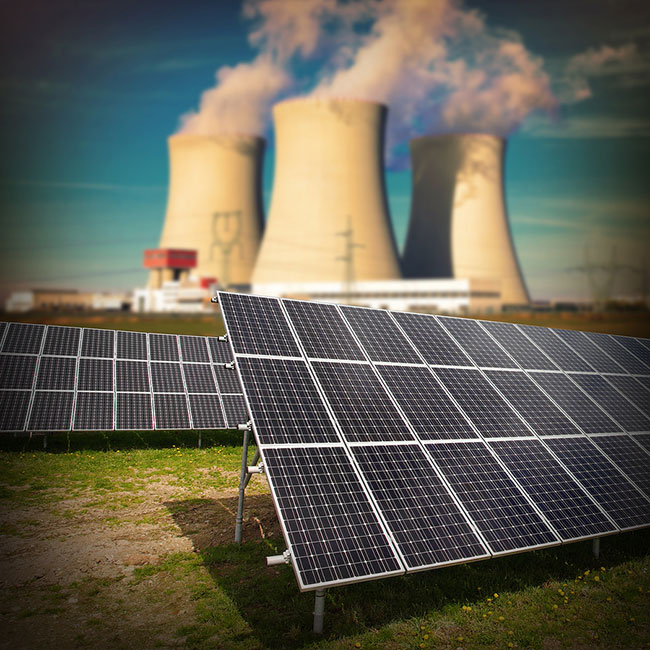
The massive deployment of renewables has helped global CO2 emissions fall.
Interesting news from two separate studies from different agencies this week folks. The first — from the International Energy Agency (IEA) — found that carbon emissions have stalled worldwide for the second year in a row. The second, from the International Renewable Energy Agency (IRENA), outlined the associated benefits of doubling the share of renewables in the world energy mix.
Let’s unpick the main points:
IEA report: the summary
- Carbon emissions were steady at 32.1 billion tonnes in 2015.
- Emissions have essentially remained at their present level since 2013.
- The takeup of renewables (more than 90 percent of new electricity in 2015) has been largely responsible for this lack of movement.
- This is the first time that global emissions have stalled during times of economic growth, according to the IEA.
The key quote:
“The new figures confirm last year’s surprising but welcome news: we now have seen two straight years of greenhouse gas emissions decoupling from economic growth,” said IEA Executive Director Fatih Birol. “Coming just a few months after the landmark COP21 agreement in Paris, this is yet another boost to the global fight against climate change.”
IRENA report
The IRENA report — Roadmap for a Renewable Energy Future — which was released last week at the Berlin Energy Transition Dialogue, looks at the key benefits of the world doubling its commitment to renewables.
The inter-governmental organisation found that, not only are there obvious environmental and climate advantages in reducing the level of carbon emissions but that the move would save trillions of dollars.
According to the study, doubling up on renewables by 2030 would:
- Keep the average global temperature rise to 2 °C above pre-industrial levels (when coupled with energy efficiency);
- Avoid up to 12 gigatonnes of energy-related CO2 emissions in 2030 – five times higher than what countries have pledged to reduce through renewable energy in their nationally determined contributions (NDCs);
- Result in 24.4 million jobs in the renewable energy sector by 2030, compared to 9.2 million in 2014;
- Reduce air pollution enough to save up to 4 million lives per year in 2030;
- Boost the global GDP by up to USD 1.3 trillion.
The key quote:
“Achieving a doubling is not only feasible, it is cheaper than not doing so,” said IRENA Director-General Adnan Z. Amin. “REmap shows this is not only the most economic pathway, but also the most socially and environmentally conscious. It would create more jobs, save millions of lives from reduced air pollution and set us on a pathway to limit global temperature rise to two degrees as agreed in Paris.”
The term “decoupling” has been used in recent times as a buzzword to describe how it’s possible to have economic growth yet keep carbon emissions at present levels. Some have even suggested present and future improved efficiencies and technological breakthroughs may herald economic growth and lower carbon emissions.
The IEA report would seem to confirm this phenomenon as emissions figures have not increased in two years; a time of economic growth. Figures released by the International Monetary Fund with global economic growth at 3.4 percent for 2014 and 3.1 percent for 2015.
Is this pause in the levels a cause for patting ourselves on our backs? No, according to leading author, scientist, climate spokesman Tim Flannery who pointed out that it is not enough to halt the advance of emissions. We need to cut emissions and quickly.
“People understand the urgency now, people understand how late it is to act, so we’re better prepared. The politicians understand it better, the bureaucrats understand it better,” he said following the Paris climate talks in 2015.
“People understand the need to cut ‘hard and fast’ now, before it’s too late, and we are locked into something truly catastrophic.”
Embracing renewables then is a no-brainer if we are to achieve the goal of reducing carbon emissions while not sacrificing economic growth. However the benefits of doing so go far beyond just keeping global warming in check as the IRENA report has shown.
The two reports, while differing in focus and scope both point to the same conclusion: that a renewables future, has far more benefits than just saving our planet. While reducing carbon emissions must be a goal of any responsible society to leave a planet — not a wasteland — for our children, there are also economic, employment and health reasons for doing so.

 RSS - Posts
RSS - Posts



I hope the flat earth LNP pollies don’t hear about this (the IEA report) The likes of G Hunt .etc. They’ll treat it as a carte blanche to dig up (more) coal and further renege on renewables investment.
They have just come up with $3.3 million for universities to “investigate” wind turbine syndrome. Go figure that one folks! (Its really caused by the aliens that live under the turbine towers!)
“Embracing renewables is a no-brainer …” unless you’re an LNP pollie living in the dark ages and are still trying to invent the wheel.